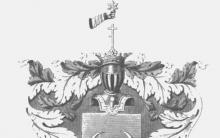Collection of works: Female images in A. N. Ostrovsky's plays "The Thunderstorm" and "Dowry"
Two dramas by A. N. Ostrovsky are devoted to the same problem - the position of women in Russian society. Before us are the fates of three young women: Katerina, Varvara, Larisa. Three images, three destinies.
Katerina differs in character from all the characters in the drama “The Thunderstorm”. Honest, sincere and principled, she is not capable of deception and falsehood, resourcefulness and opportunism. Therefore, in a cruel world where wild and wild boars reign, her life turns out to be unbearable and impossible and it ends so tragically. Katerina’s protest against Kabanikha is a struggle of the bright, pure, human against the darkness of lies and cruelty of the “dark kingdom.” No wonder Ostrovsky, who paid great attention to names and surnames, gave the heroine of “The Thunderstorm” the name Ekaterina, which translated from Greek means “eternally pure.” Katerina is a poetic person. Unlike the rude people around her, she feels the beauty of nature and loves it. It is nature that is natural and sincere. “I used to get up early in the morning; in the summer, I’d go to the spring, wash myself, bring some water with me and that’s it, water all the flowers in the house. I had many, many flowers,” she says about her childhood. Her soul is constantly reaching out to beauty. Her dreams were filled with miracles, fabulous visions. She often dreamed that she was flying like a bird. She talks about the desire to fly several times. With this, Ostrovsky emphasizes the romantic sublimity of Katerina’s soul. Married early, she tries to get along with her mother-in-law, to love her husband. but in the Kabanovs’ house no one needs sincere feelings. The tenderness that fills her soul finds no use. Eco woe! I don’t have any children: I would still sit with them and amuse them. I really like talking to children - they are angels.” What a loving wife and mother she would have been under different conditions!
Katerina’s sincere faith differs from Kabanikha’s religiosity. For Kabanikha, religion is a dark force that suppresses the will of man, and for Katerina, faith is the poetic world of fairy-tale images and supreme justice. “... I loved going to church to death! Surely, it used to be that I would enter heaven, and I didn’t see anyone, and I didn’t remember the time, and I didn’t hear when the service was over,” she recalls.
Bondage is Katerina's main enemy. The external conditions of her life in Kalinov seem to be no different from the environment of her childhood. The same motives, the same rituals, that is, the same activities, but “everything here seems to be from under captivity,” says Katerina. Captivity is incompatible with the freedom-loving soul of the heroine. “And captivity is bitter, oh, so bitter,” says she is in the scene with the key, and these words, these thoughts push her to the decision to see Boris. Katerina’s behavior, as Dobrolyubov said, revealed a “decisive, integral Russian” who “will withstand himself, despite any obstacles, and when his strength is not enough, he will die, but will not betray himself.”
Varvara is the complete opposite of Katerina. She is not superstitious, is not afraid of thunderstorms, and does not consider strict adherence to established customs obligatory. Due to her position, she cannot openly oppose her mother and therefore is cunning and deceives her. She hopes that marriage will give her the opportunity to leave this house, to break out of the “dark kingdom.” To Katerina’s words that she doesn’t know how to hide anything, Varvara replies: “Well, you can’t live without it! Remember where you live! Our whole house rests on this. And I was not a liar, but I learned when it became necessary.” Varvara despises her brother’s spinelessness and is indignant at her mother’s heartlessness, but she cannot understand Katerina. She is only interested and concerned about the external side of life. She resigned herself and adapted to the laws of the old world around her.
Larisa, unlike Katerina, grew up and was raised in conditions where the weak are humiliated, where the strongest survive. Her character does not have the integrity that Katerina has. Therefore, Larisa does not strive, and cannot, realize her dreams and desires. Her name translated from Greek means “Seagull”. This bird is associated with something white, light, piercingly screaming. And this image fully corresponds to Larisa.
Katerina and Larisa have different upbringings, different characters, different ages, but they are united by the desire to love and be loved, to find understanding, in a word, to become happy. And each one goes towards this goal, overcoming the obstacles created by the foundations of society.
Katerina cannot connect with her loved one and finds a way out in death.
Larisa's situation is more complicated. She became disillusioned with her loved one and stopped believing in the existence of love and happiness. Realizing that she is surrounded by lies and deception, Larisa sees two ways out of this situation: either the search for material values, or death. And given the circumstances, she chooses the first. But the author does not want to see her as an ordinary dependent woman, and she leaves this life.
* This work is not a scientific work, is not a final qualification work and is the result of processing, structuring and formatting the collected information intended for use as a source of material for independent preparation of educational works.
A.N. Ostrovsky spent a very long time looking for the main characters of his plays “The Thunderstorm” and “Dowry.” He went through many options, he needed a hero who would at the same time evoke in the reader: contempt, pity, delight and sympathy. And as they say, “those who seek will always find,” so Ostrovsky found what he wanted. And it seems to me that it was not for nothing that he chose the main characters so carefully, since they really fit these roles, even if it was the main character of the story “thunderstorm” - Katerina, or the main character of the story “dowry” - Larisa. They are both very interesting characters, to some extent they are even very similar, but it is impossible to say that they are the same, because they are not.
In the story “Thunderstorm,” the main character Katerina had a hard time taking into account. Yes, at the beginning we see a faithful wife who loves her husband, one might even say daughter-in-law, who is trying to find have a common language with my husband’s mother, i.e. with my mother-in-law. But then, when we begin to learn more and more new things about Katerina, we begin to understand that she does not love her husband at all, she remains faithful only because she knows that it is her duty. And she tries not to conflict with her mother-in-law just so that it will be at least a little easier for her to live in a house where there are only scandals, and which, of course, did not pass without the presence of her grumpy mother-in-law Marfa Ignatievna Kabanova.
And so we see that Katerina seems to find her happiness and fall in love. But even here she cannot be happy, since she is married and there can be no talk of anything like that. But still she goes against the rules and cheats on her husband with a young man, Boris Grigorievich. We also see that Katerina could not live with such a sin in her soul, and publicly admitted her betrayal. Of course, almost no one understood her and treated her with contempt. Out of shame, she wants to leave with Boris, whom she loves, but he refuses her and leaves alone. And Katerina decides to commit suicide and jumps off a cliff.
As for the story “The Dowry,” it is easier for the main character Larisa, since she is not married and is a completely free girl. But for some reason this does not stop her from ruining her life, at least by the fact that she gives consent to marriage to someone whom she does not love at all. And she loves her ex-fiancé Paratov, who left her and left. And he returned only when Larisa was almost a married girl. And as you might guess, of course it ruins the lives of both Larisa and her fiancé Karandyshev. Paratov deceives the naive Larisa, one might even say he simply uses her as a toy. And of course he leaves her and is not at all going to marry her, as he promised her earlier. And she remains alone, unhappy and deceived. Since Larisa cheated on her fiancé, she now cannot return to him, and besides, Karandyshev himself already knows about everything and is in anger looking for Paratov and Larisa. A Larisa, meanwhile, in despair approaches the cliff and wants to commit suicide, but does not dare to do so, and exclaims: “As if someone would kill me now...” And some minutes pass and her desire comes true. Or more precisely, Larisa dies at the hands of her deceived fiancé Karandyshev.
And so, personally, I think that the plays “THE STORM” and “THE MESS” are not so similar, or rather similar only in that both main characters die tragically at the end of the plays. And so, in their very essence, these two plays are completely different and the fates of Katerina and Larisa are not at all similar.
Of course, if these events took place in our time, then perhaps the endings of plays “D” and “B” would have turned out completely differently.
Essay on the topic: “Two destinies, two tragedies” based on the works “The Thunderstorm” by A. N. Ostrovsky, “Lady Macbeth of Mtsensk” by N. S. Leskov. Two destinies, two tragedies... Who are these sad words about? These words are about two heroines: Ekaterina Kabonova and Ekaterina Izmailova, from the works “The Thunderstorm” and “Lady Macbeth of Mtsensk”. So what is their tragedy? To do this, you need to turn to the content of the works. In both plays, the main characters are called Katerina, as mentioned above. Let's start with the first of them. Katerina Ostrovsky spends all her days in a merchant's house, in merchant's boredom. Childlessness strengthens it even more. Katerina herself speaks about this: “Oh, what boredom! At least someone's children! Eco woe! I don’t have any children: I would still sit with them and amuse them...”
The only thing that consoles Katerina is her memories and dreams. She lives by them, talks about her former life: “I lived, didn’t worry about anything, like a bird in the wild. Mama doted on me, she dressed me up like a doll, she didn’t force me to work, I did whatever I wanted.” If before she lived “like a bird in the wild,” now it’s like in a cage. It’s the same with the other Katerina, the same merchant family, the same blues. The fate of the other Katerina is similar: the same merchant's house, boredom.
And childlessness makes the situation worse. Katerina Leskova says almost the same words: “If I gave birth to a baby, it would seem that I would have fun with him.” The work says about boredom: “Russian boredom, the boredom of a merchant’s house, which makes it fun... even to hang oneself.” And one of the great people said that work feeds, clothes and saves from sin. And here this statement turned out to be true, only the opposite of it - idleness led to sin - betrayal of her husband and murder. Katerina Izmailova falls in love with Sergei, her husband's assistant. This, of course, led to the indignation of the father-in-law. Katerina solves this problem in the simplest way, she simply kills him, but the point is also in how she does it. She does this secretly, adding rat poison to her “beloved” father-in-law’s mushrooms - he died a “rat death.” But the story doesn't stop there.
Because my husband arrived. Here Katerina, not embarrassed by anyone or anything, simply strangles her betrothed. And before that, she simply mocked him, kissing Sergei passionately. By the way, the epigraph to the drama develops here: “I was about to sing the first song.” That is, the “first song” - the first murder, “started to sing” - to do, embarrassed, afraid of something. But Katerina sings the second “song” very confidently. There are already two “songs” on Katerina’s conscience, although this conscience is lost somewhere. The “second opera” was followed by a third. The third was the murder of the innocent Fedya. Katerina has gone so far that she is already killing for nothing. After all, she killed a six-year-old boy in order not to give him part of their fortune. But would a little boy demand money? Probably no. This vice has gone so far in Katerina that she is ready to solve all problems with murder. But let’s return to the other Katerina, how are events developing there? I’ll get ahead and say that Katerina was a righteous person (unlike her mother-in-law).
This is proven by one fact: in her youth she went to church every day and prayed there so earnestly that one day angels appeared to her! To what extent do you need to believe in the existence of the latter and pray earnestly for something like this to appear? As I already said, Katerina lives “like a bird in a cage,” and she is also haunted everywhere by the remnants of the old generation - her mother-in-law. She, like Izmailova, did not marry for love. And she didn’t get the best husband: everything leads to Katerina falling in love with another person - Boris Grigorievich. She thinks about him all the time, but tries to forget him because she knows that it is a sin. Katerina suffers, but she can’t do anything: “Some kind of dream is creeping into my head. And I won’t leave her anywhere. If I start to think, I won’t be able to collect my thoughts; I’ll pray, but I won’t be able to pray.” And here her husband is leaving on a business trip. There is a chance to meet Boris, but Katerina, due to her morality, still stops and says: “So we’ll sit down to sew with Varvara, and we won’t see how time passes; and then Tisha will come.” She hopes to forget Boris, maybe this would have happened anyway, but Tikhon’s sister arranged for her to meet. Everything became clear: Katerina met with Boris for the entire two weeks in her husband’s absence. But how could Katerina agree to a date? This happened at the moment when Varvara gives the key to Katerina, and Katerina, probably subconsciously, guided by her strong feelings, takes it under the pretext: “they say, someone is coming there...”. But after the latter returned, Katerina, by her righteous nature and under a coincidence of circumstances (thunderstorm), tells the whole truth... Naturally, a scandal was inevitable.
Here comes the climactic moment when Katerina decides the “Shakespearean” question: “to be or not to be.” Reasoning that it would be more pleasant for her to die than to come to this merchant’s house again, she rushes into the Volga. And at this moment “the cage opened and the bird flew to freedom,” because water is a symbol of freedom. By the way, I mentioned Shakespeare, but isn’t the situation in the “Mtsensk district” and the city of Kalinin similar to the situation in Shakespeare’s works? Maybe not in The Thunderstorm, but in another play everything is practically the same: the same love mixed with blood. But according to Shakespeare, in the end the heroes repent, but Katerina and Sergei don’t even think about it. It’s as if this is how it should be: everything happens cynically and cheerfully. Passions end only when Katerina dies herself. Moreover, he dies, killing his “rival” and enemy – Sonetka, in jealousy of her lover, because she loves him so much. Even “the hard labor path blooms with happiness.” But is this love too blind? After all, she doesn’t even pay attention to how dryly he treats her.
And she forgets about everything, even about the child she wanted so much - she simply refuses him. And remember what she said about this: “If I gave birth to a child, it would seem that I would have fun with him.” The word “seems” played its role. And all because she sees nothing in life except Sergei. In my opinion, Sergei is the “tempter demon” here. After all, it was because of him that Katerina did all this. Katerina Leskova doesn’t want to die - she just wants to take revenge on Sonetka. By the way, why not Sergei? After all, in principle, he is to blame, but Katerina cannot do this because of her strong love. Katerina takes revenge according to a well-oiled mechanism, but she is too lost in her feelings and dies just like Ostrovsky’s Katerina in the water… Death led that other Katerina to liberation. What led to death? Love.
It should be noted that Leskov contrasted his Katerina with Ostrovsky. And in the plot parallelism, the features of a Russian woman appear. If you collect the qualities of our heroines, you will get a portrait of a real Russian woman: determination, love of freedom, righteousness, determination, love, strong feelings.











Major Arcana Tarot Tower: the meaning of the upright and inverted card
Removing a lapel from yourself and your loved ones How to remove a lapel from money
Unction - a sacrament that heals soul and body
Patriarch Nikon. Short biography. Patriarch of Moscow and All Rus'. Nikon Church Nikon
What is consolidated reporting?